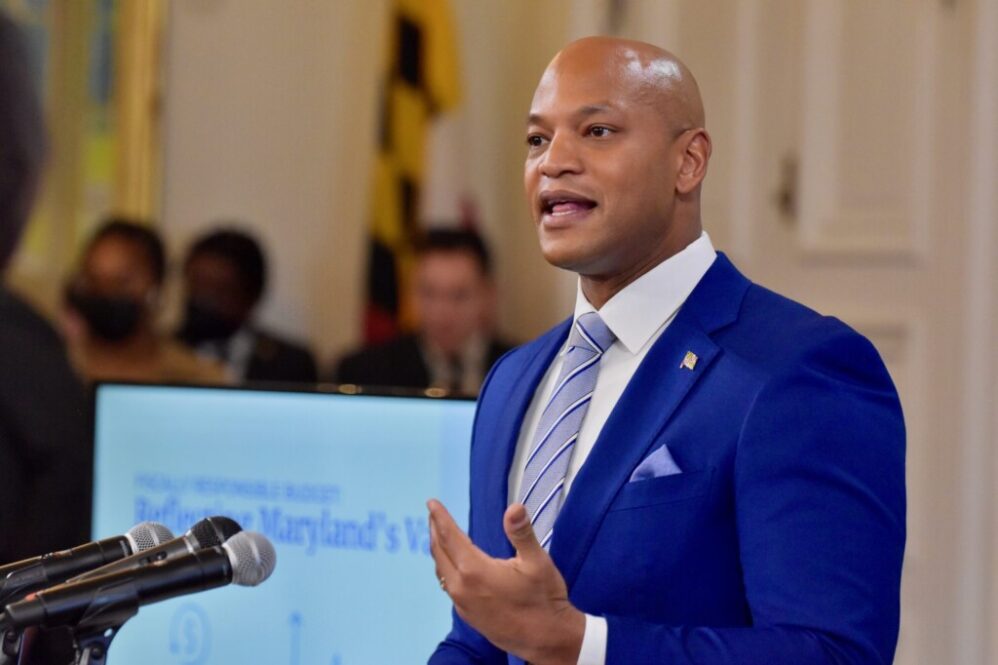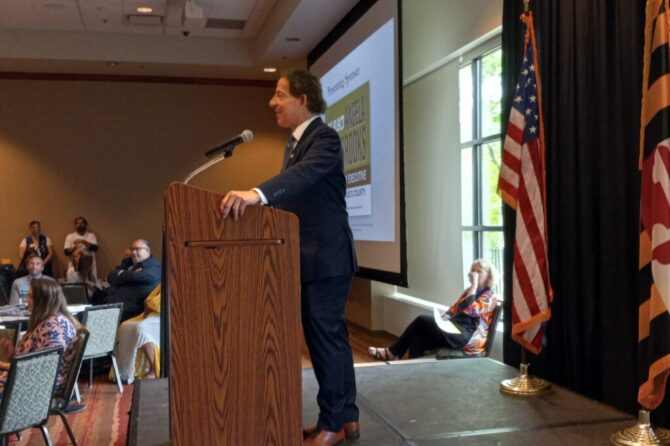MARYLAND MATTERS: In 2022, approximately 160,800 Maryland children lived in poverty across the state, according to data from the Annie E. Casey Foundation Kids Count Data Center. Gov. Wes Moore (D) is pushing legislation in the 2024 session to provide $15 million in state funds to help bolster communities with higher rates of child poverty.
On Monday, he highlighted one of the bills featured among his 2024 priorities to bring down the rates of childhood poverty in Maryland during a news conference Monday at LIFE Ministries Church in Anne Arundel County.
“Instead of freely spreading money around, we’re going to target places that are most in need of our help,” Moore said.
The legislation, Senate Bill 482, is referred to as the “ENOUGH Act of 2024,” which stands for “Engaging Neighborhoods, Organizations, Unions, Governments, and Households.”
Moore argued that Maryland needs to be strategic about solving childhood poverty and that solutions should be tailored to each struggling community.
“Money is important. Strategy is imperative,” he added.
The 2024 legislative session features a tight fiscal picture for Maryland lawmakers. Legislative leaders have indicated that this session will be a time to prioritize projects to ensure that funds for the administration’s goals, such as reducing childhood poverty, are used efficiently and responsibly.
As is customary, Senate President Bill Ferguson (D-Baltimore City) is sponsoring the legislation for the administration.
“It’s about focused, collaborative effort, not just by government, but with philanthropic partners with the private sector, with agencies who have a dedicated focus collaborating on a dedicated space,” Ferguson said at the news conference, which took place in one of Anne Arundel County’s most poverty-stricken neighborhoods, a short distance from the Baltimore City line. It was near the city’s Brooklyn neighborhood, which saw a mass shooting over the Fourth of July weekend last year.
The legislation does not have a House version filed yet, but House Speaker Adrienne A. Jones (D-Baltimore County), speaking at the event Monday, urged Marylanders to be more respectful, patient and decent to the members within their communities.
“And in doing so we can help our most vulnerable our children, schools and businesses live and coexist in strong and supportive communities,” she said.
Lt. Gov. Aruna Miller (D) attended but did not speak at the news conference.
The legislation would earmark $15 million to go towards community-specific causes of poverty in low-income parts of Maryland. The funding creates grant opportunities designed to “advance place-based strategies targeting child poverty.”
The competitive grant awards could go towards a variety of recipients within a community such as small business owners, local school districts, health clinic locations, and faith-based entities, unions, and others.
Grant recipients would partner with state officials to work towards a variety of poverty-reduction goals. Those efforts include connecting residents to jobs and in-demand occupations for their areas, improving community health and safety, and creating better access to education opportunities.
The grants would help the private sector and nonprofits implement those goals in areas where census data indicates that more than 20% of children within a community live in poverty. It would go to projects that represent “a partnership that includes at least one community-based organization, one public school and one local government.”
“We need to recruit community organizations that are doing the work of people who’ve been fighting these fights for their whole lives. They know their neighborhoods, they know their communities,” Moore said. “Because every community is unique.”
Moore said that each community can have different struggles that contribute to poverty in an area.
“Maybe in your community, there’s no job training,” Moore said. “Maybe in your community, there’s no transportation. Maybe in your community, the nearest health care provider is actually across state lines. Maybe in your community, it’s not safe for kids to play after school.”
The ENOUGH Act is part of Moore’s 2024 legislative package, a collection of 16 bills aiming to tackle public safety, housing affordability, and childhood poverty.









